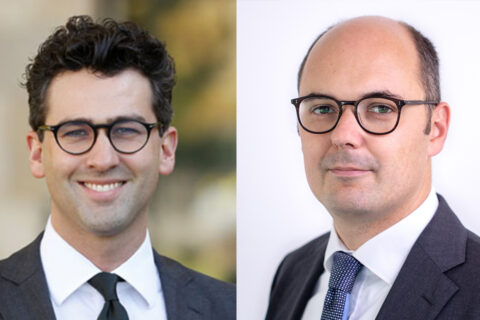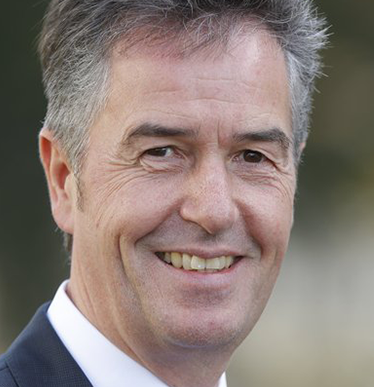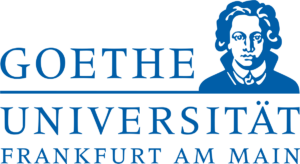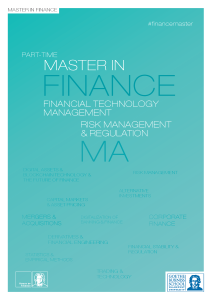current research projects

Cybercrime on the Ethereum blockchain In a joint project of the Technical Universities of Dresden and Munich, the Hornuf/Momtaz research team wants to investigate the risks associated with the use of the Ethereum blockchain. Specifically, it is about the effects of cybercrime on investor behavior: On the one hand, it is investigated how investor behavior … read more

Inflation Risk, Energy Prices and Implicationsfor Monetary Policy and Financial Stability The transmission mechanism of energy price changes is the focus of the project by Volker Wieland of Goethe University Frankfurt. The intention is to develop a macro-structural model to better understand the relationship between energy prices, inflation, monetary policy, and financial sector stability. This … read more

Personalized communication and repayment The project aims to investigate the extent to which delinquent debtors are motivated to make outstanding payments by different communication strategies. The starting point is the consideration that there is less direct customer contact in the course of digitization and that this also reduces the willingness to pay. Depending on the … read more

The project addresses the question of how effective investor pressure on public companies is to reduce climate emissions. One way to reduce emissions is selling climate-damaging assets to companies that are less in the public eye, like private companies. This could lead to a kind of disclosure arbitrage, but not to a real reduction in … read more

Digital assets are becoming increasingly important. This project aims to investigate the integrity of different trading platforms for such assets, addressing a current topic, which is important for both investors and regulators. In the first part, a taxonomy of such platforms will be developed. Different categorizations are envisaged: centralized or decentralized, transparency via smart contracts, … read more

The project is based on the discussion at the FIRM Fall Conference, where the proposers presented a paper on “A machine learning approach to measuring non-answers.” On it Building on this, the new project will analyze operational ESG risks and climate risks. Climate risks are defined as exogenous, ESG risks as endogenous. The basic idea … read more
Promotion
Research projects and their results are not only important building blocks for better addressing today’s and tomorrow’s risk management and regulatory challenges, but also create the foundation for tomorrow’s forward-looking teaching opportunities. In accordance with this understanding, FIRM emphasizes the implementation of research projects that can be realized in the participating universities, but also beyond them at other suitable institutions.
In order to stimulate international scientific discussion on research results in the field of risk management and regulation, FIRM aims to promote research at a high quality level, the results of which will be published in top journals and conferences of worldwide repute. In addition, rapid feedback into financial practice will be realized for certain parts of the results via special knowledge transfer procedures, thus also enabling a close connection of the researchers with outstanding capacities from business and public administration in the field of risk management and regulation.
In this context, FIRM welcomes the formation and use of national and international networks of scientists and would like to expand the position of Frankfurt am Main as a scientific location in these networks.
Once a year (about a month before Easter), FIRM invites outstanding researchers to submit project proposals using a structural template, which are evaluated in a “double-blind” manner by three scientists selected from a high-ranking panel – after taking note of these recommendations, the Board of Directors formulates a ranking order, which is submitted to the two presidents of FIRM for a decision. Assessment criteria here include: Novelty of the insight approach, quality of the research process, relevance of the expected results, realism of the project plan and also the previous publication performance (whereby the latter can only be viewed by the board).
Since 2010, FIRM has funded well over 40 such project funding applications from 20 universities and colleges with a total volume of around EUR 3 million (as at the end of 2023).
Contact
forschung@firm.fm
or
Prof. Dr. Rainer Klump
Executive Director of the House of Finance
Theodor W. Adorno Square 3
60323 Frankfurt
Klump@hof.uni-frankfurt.de
Research History
| Project Manager / University | Research project | Summary |
|---|---|---|
| Prof. Dr. Söhnke M. Bartram / Warwick Business School | Firm Responses to Climate Policy: Evidence from the California Cap-and-Trade Rule | Download |
| Prof. Dr. Peter Gomber / Goethe-Universität Frankfurt | Research Unbundling: Höhere Kapitalkosten und Finanzierungsrisiken für KMUs als unbeabsichtigte Folgen der MiFID II? | Download |
| Prof. Dr. Ulf Moslener / Frankfurt School | Deep Uncertainty and Investments in the Context of the Energy Transition | Download |
| Dr. Daniel Hoang / Karlsruhe Institute of Technology (KIT) | Unternehmensdiversifikation und Kapitalstruktur | |
| Prof. D. Peter Grundke / Universität Osnabrück | Systemic risk measurement and model risk | |
| Prof. Dr. Christina E. Bannier / Justus-Liebig-Universität Gießen | Kreditrisiken und Zahlungsmoral im digitalen Zeitalter – Eine experimentelle Studie zum Thema „Nudging“ | |
| Prof. Dr. Sascha Steffen / Frankfurt School of Finance & Management | Sovereign Risk, Regulatory Forbearance and Bank Risk Taking Incentives | Download |
| Prof. Dr. Tobias Berg / Frankfurt School of Finance & Management | On the Rise of FinTechs – Credit Scoring Using Digital Footprints | Download |
| Prof. Dr. Valeriya Dinger / Universität Osnabrück | Bankenrettungsaktionen und Wirtschaftswachstum | Download |
| Prof. Dr. Peter Grundke / Universität Osnabrück | Do market-based systemic risk measures deliver what they promise? | |
| Prof. Dr. Natalie Packham / Hochschule für Wirtschaft und Recht Berlin | Analyse und Entwicklung von Stresstestmethoden für Kreditportfolios | Download |
| Prof. Dr. Peter Tillmann / Justus-Liebig-Universität Gießen | Bank Risk-Taking and Unconventional Monetary Policy | |
| Prof. Dr. Marliese Uhrig-Homburg, Dr. Philipp Schuster / Karslruher Institut für Technologie – KIT | Asset Pricing, Liquiditätseffekte und Optionsrenditen | |
| Prof. Dr. Ralf Jasny, Sebastian Rick / Frankfurt University of Applied Sciences | Begrenzung von Compliance-Risiken: Einsatz kausalanalytischer Modelle zur Messung der Wirksamkeit von Compliance-Programmen | Download |
| Prof. Dr. Isabel Schnabel / Rheinische-Friedrich-Wilhelms-Universität Bonn | Asset Price Bubbles and Systemic Risk | |
| Prof. Dr. Peter Gomber / Goethe-Universität Frankfurt | Management von Marktpreisrisiken: Regulierung und Koordination von Volatilitätsunterbrechungen in Europa | |
| Prof. Dr. Thilo Meyer-Brandis / Ludwig-Maximilians-Universität München | Measuring and managing systemic risk in the interbank market | |
| Prof. Dr. Bernd Weber / Center for Economics and Neuroscience und Klinik für Epileptologie, Universität Bonn | Individuelle Risikoeinstellungen – biologische und psychologische Einflüsse auf Anlageverhalten | Download |
| Prof. Dr. Ester Faia | Risk Cascades in Banking Networks and the Measurement of Systemic Risk | |
| Prof. Dr. Uwe Walz / Department of Economics, Goethe University (Frankfurt) | Incentives, Risk Selection and Leveraged Finance: Implications for Risk Management | Download |
| Prof. Dr. Mark Wahrenburg / Faculty of Economics and Business Administration, Goethe University (Frankfurt) | Operational Risk and Corporate Governance | Download |
| Prof. Dr. Mark Wahrenburg / Faculty of Economics and Business Administration, Goethe University (Frankfurt) | Effects of Tightening bank Resolution Regimes on Bank Risk-Taking – Evidence from US an European Banks | Download |
| Prof. Dr. Bernd Skiera / Department of Marketing, Goethe University (Frankfurt) | Effects of non-banking on the stability in the financial industry | Download |
| Prof. Dr. Wolfgang Schmidt / Centre for Practical Quantitative Finance, Frankfurt School of Finance & Management (Frankfurt) | The behaviour of correlations during different market phases: modelling, empiricism and consequences | Download |
| Prof. Dr. Daniel Rösch / Universität Regensburg | LGD-Modellierung, Downturn-Prognose und Stresstesting mit fortgeschrittenen statistisch-ökonometrischen Methoden des Risikomanagements | |
| Prof. Dr. Daniel Rösch / Institute of Banking and Finance, Leibniz University (Hannover) | Minimum requirements of ratings and regulatory capital for securitisation transactions | Download |
| Prof. Dr. Roman Inderst / Goethe Universität (Frankfurt) | Determinanten und Stabilität privater Einlagen – Implikationen für Refinanzierungsmodelle und Aufsicht | |
| Prof. Dr. Christian Laux / Center for Financial Studies, Goethe University (Frankfurt); Vienna University of Economics and Business (Vienna) | Accounting and procyclicality – implications for financial stability and regulation | |
| Prof. Dr. Dominik Georgi / Deutsche Bank Chair for Retail Banking and Service Management, Frankfurt School of Finance & Management (Frankfurt) | The customer protection perspective on risk management: Understanding the influence of bank advice on private investors’ investment decisions | |
| Prof. Dr. Rainer Baule / Fernuniversität Hagen | Objektivität und Wirkung des Issuer Estimated Value (IEV) | Download |
| Prof. Dr. Rainer Baule / Faculty of Economic Sciences, University of Siegen (Siegen) | The regulation of emissions of structured financial products for retail investors | Download |
| Prof. Dr. Christina Bannier / Finance Department, Frankfurt School of Finance & Management (Frankfurt) | What objective function follows the creation of credit ratings? Implications for financial market stability and regulation | Download |
| Prof. Tim Adam, Ph.D. / Institute of Corporate Finance, Humboldt University (Berlin) | Did the Reputation of Rating Agencies suffer from the Financial Crisis? | |
| Prof. Dr. Isabel Schnabel / Johannes Gutenberg-Universität Mainz | Did Policy Interventions in the Crisis Foster Financial Disintegration? | |
| Prof. Dr. Andreas Pfingsten / Westfälische Wilhelms-Universität (Münster) | Die Zyklität der Bildung von Wertberichtigungen in deutschen Banken (Themenfeld: Konvergenz und Konflikte von Risikosteuerung und Rechnungslegung) | Download |
| Prof. Dr. Natalie Packham / Frankfurt School of Finance & Management (Frankfurt) | Messen von Modellrisiko dynamischer Hedgingstrategien unter Berücksichtigung regulatorischer Anforderungen und zu Erhöhung der Finanzmarktstabilität | Download |
Teaching

Master of Finance (MSc)
The Master of Finance program of the Frankfurt School of Finance & Management is an internationally recognized master program that brings together finance experts and a highly motivated student body to create an unparalleled learning environment. Situated in continental Europe’s leading financial hub and with access to Germany’s largest finance faculty, the program sets the foundation for a successful career in finance.
The curriculum offers a high degree of flexibility through a 3-day model in which students are able to work part-time up to three days per week parallel to studying.
Highlights & Concentrations
- According to Financial Times ranking Master of Finance at Frankfurt School is ranked as one of best programs in Germany.
- MBA-style learning environment with diverse student body comprising 34 nationalities
- Concentrations in Capital Markets, Corporate Finance, Risk Management, and Financial Advisory
- Access to high-profile practitioners from the corporate world
- Member of CFA University Recognition Program and academic partnership with GARP
- Academic partner with CAIC
- Executive talks with leading representatives in Risk Management in cooperation with the Frankfurt Institute for Risk Management and Regulation (FIRM). Participation in the FIRM alumni initiative.
The persistent crisis of the global financial system results in an increased need for experts and leaders to manage financial and non-financial risks in both a professional and sustainable way. In the Risk Management concentration students receive comprehensive insight into the structure, methods and applications of modern risk management. Combining theoretical models with case studies and research prepares students to take on the challenges of today’s risk management and regulation business. The concentration is supported by FIRM, the Frankfurt Institute for Risk Management and Regulation. FIRM provides some scholarship funding as well as arrange internships. Students will also be invited to executive talks with leading representatives in Risk Management and to participate in the FIRM alumni initiative.
Download

Master of Finance Brochure

Part-time Master in Finance
The innovative Master in Finance at Goethe Business School offers ambitious professionals the opportunity to deepen their financial expertise in parallel to their professional career in an international university environment. In the Eduniversal Best Masters Ranking, the programme repeatedly occupies the best places among corporate finance programmes in Germany.
The curriculum of the Master in Finance has two specialisation options – Financial Technology Management or Risk Management & Regulation – and is thus specifically geared to the particular requirements of the market and the high demand for young talent in these fields.
The part-time programme starts annually in April and can be completed within 22 months. Graduates receive a Master of Arts in Finance (90 ECTS CP) degree from the AACSB-accredited Department of Economics at Goethe University Frankfurt.
As a minimum requirement for admission to the program, potential applicants must have a bachelor’s degree (180 CP) or equivalent, one year of professional experience, strong quantitative skills, and a good command of English.
The Master in Finance program offers:
- Broad fundamental knowledge in finance theory and practice
- Current research results and applied knowledge in the two specialization areas of Financial Technology Management and Risk Management & Regulation.
- Highly qualified lecturers from the House of Finance, the Department of Economics at Goethe University and from industry practice
- Job-compatible format and an ideal work-study balance with lectures every 2 weeks on Friday afternoons and Saturdays
- Finance-focused location in the House of Finance at Goethe University’s Westend Campus in the European financial center of Frankfurt
- Access to a large network of GBS alumni and international finance community
- Partner program of the CFA Institute
- Attractive scholarships from the Frankfurt Institute for Risk Management and Regulation (FIRM)
Visit us on campus
The Goethe Business School team will be happy to advise you and answer your individual questions! Sign up for one of our Information events or arrange to get to know us in person during a campus visit!
Contact
GBS Recruiting & Admissions
+49 69 798 33501
recruiting@gbs.uni-frankfurt.de

Part-Time Master in Finance” brochure
